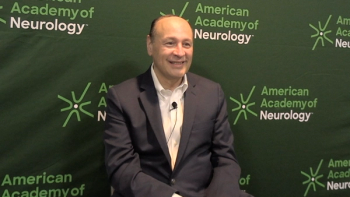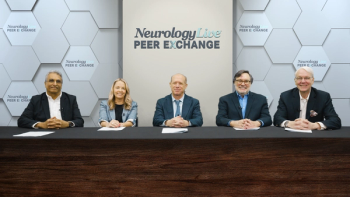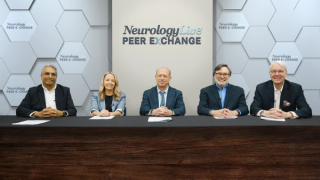
Parkinson Disease
Latest News

Latest Videos

CME Content
More News

Phase 2 Findings Support Further Development of 5-HT1A Receptor Agonist NLX-112 in Parkinson Disease
NLX-112 demonstrated safety and potential efficacy in reducing levodopa-induced dyskinesia and improving motor symptoms in Parkinson disease, with additional benefits seen in patients also receiving stable amantadine.

Panelists discuss how limitations persist with current long-term treatment standards for Parkinson disease despite advancements in treatment options.

Panelists discuss how alternative formulations and administration routes like Levodopa/carbidopa intestinal gel and deep brain stimulation have impacted advanced Parkinson disease management, including which patient populations benefit most and when these options are recommended.

In this segment, Pagan talked about how the field of neurology has changed in the last decade and shared where he sees it moving forward as well.

Pagan shared insights from InfusON patient interviews on the challenges and benefits of initiating CSAI therapy and discussed how expert roundtable recommendations can guide neurologists in managing skin nodules associated with treatment.

Panelists discuss how treatment changes in Parkinson disease are necessitated by disease progression, diminishing medication effectiveness, and emerging motor complications, examining a physician’s systematic approach to treatment adjustments and the range of available options for managing off fluctuations.

Panelists discuss how off fluctuations in Parkinson disease become increasingly prevalent as the disease progresses, significantly impacting patient quality of life through reduced mobility, independence, and overall well-being.

In this phase 2 trial, TTNS using the Geko device was safe and well tolerated but showed no significant benefit over sham in improving urinary symptoms in Parkinson disease.

Pagan discusses the excitement surrounding new therapeutics in neurodegenerative diseases and how advances in protein clearance and inflammation reduction could lead to disease-modifying treatments for conditions like Parkinson disease.

Panelists discuss how medical professionals adjust treatment regimens and create individualized plans as Parkinson disease advances in their patients.

Panelists discuss how medical professionals determine the most appropriate treatment options for patients with advanced Parkinson disease and the challenges patients face as their disease progresses over time.

Fernando L. Pagan, MD, discussed how continuous subcutaneous apomorphine infusion impacts long-term motor fluctuations in Parkinson disease, highlighting InfusON extension study findings on uninterrupted "good ON" time and reduced "OFF" periods as evidence of its real-world efficacy.

The chief scientific officer of the Parkinson’s Foundation discussed the foundation’s efforts to integrate whole genome sequencing into PD GENEration and expand access across diverse global populations. [WATCH TIME: 4 minutes]

Findings from a phase 3 study revealed that patients with Parkinson disease switching to IPX203 had greater benefits in good ON time when also taking lower doses of dopamine agonists.

Patient-Informed Phase 2 ATLANTIS Study Tests Selective D1PAM Agent Glovadalen for Parkinson Disease
Presented at the 2025 AD/PD Conference, the study incorporates patient engagement in its design and implementation, focusing on optimizing study accessibility, reducing burden, and evaluating glovadalen’s potential as an adjunctive treatment for PD.

A pilot study, presented at the 2025 AD/PD conference, evaluating the CUE1 device suggests it may help improve motor symptoms and reduce fall risk in patients with Parkinson disease.

An expert discusses D1 receptor agonists that reduce negative symptoms and the increasing availability of recent and upcoming PUMP options for Parkinson disease treatment.

An expert discusses the importance of collaborating with patients, emphasizing the value of leading with data when educating them on the efficacy of treatments, and highlights the role of providers in supporting patients as they discover the medications and supplements that work best for them, while advocating for and protecting patients to ensure they can seek the best quality of life.

An expert discusses the various forms of therapy offering nutritional support, including exercise and supplements, emphasizing that supplemental therapy, along with medication, is most effective, and highlights the potential benefits of the Mediterranean diet for Parkinson disease.

An expert discusses how patients with dyskinesia are well suited to use pumps and how subcutaneous dopamine agonists avoid the issues previously associated with oral dopamine agonists.

An expert discusses upcoming advancements in Parkinson disease treatments, including the potential release of the ND0612 pump later this year, demonstrating efficacy comparable to oral carbidopa/levodopa, the dopamine agonist tavapadon, CVN424 as a novel therapy not targeting the dopamine pathway, and ongoing stem cell and gene therapy developments, with stem cells capable of creating dopamine-producing cells entering phase 3 studies.

An expert discusses the extended form of carbidopa/levodopa (Crexont) for managing OFF episodes, highlighting trial results that show decreased OFF time and increased ON time, as well as the use of subcutaneous loading of medications in Parkinson disease, which was well tolerated with skin issues as the main adverse effects and resulted in increased ON time without worsening dyskinesia.

An expert discusses how providers can accurately track episodes of OFF and dyskinesia, highlighting their impact on patients physically, socially, and psychologically, including the challenges dyskinesia poses for sleep and fine motor tasks.

The professor of neurology at Northwestern University Feinberg School of Medicine discussed the NSD-ISS and its potential to refine PD diagnosis and clinical trial selection through biomarker-driven staging.

Test your neurology knowledge with NeurologyLive®'s weekly quiz series, featuring questions on a variety of clinical and historical neurology topics. This week's topic is on Parkinson disease.











